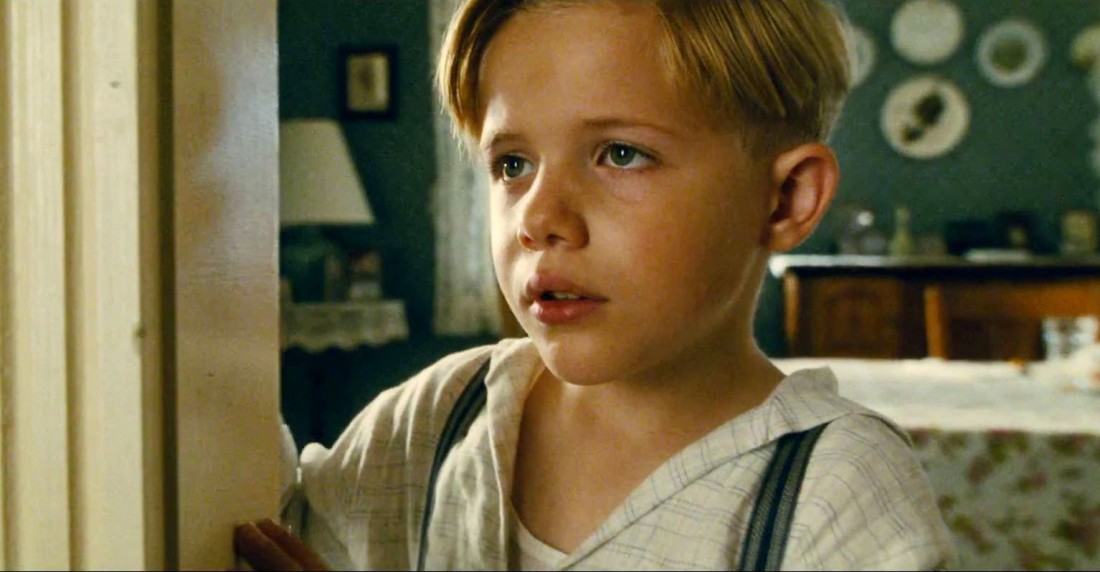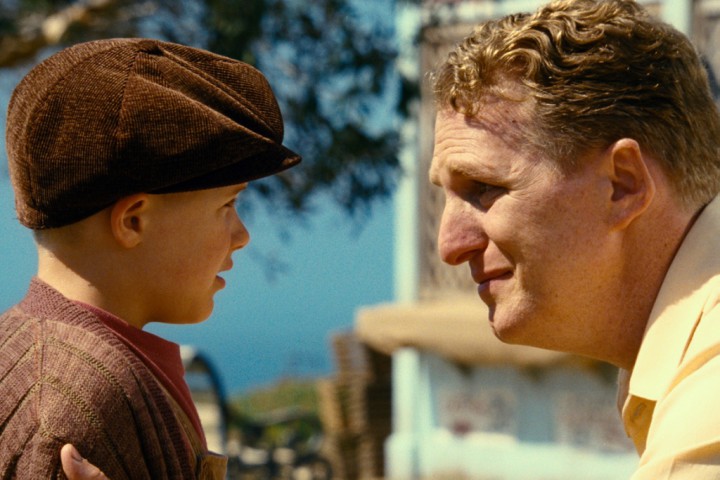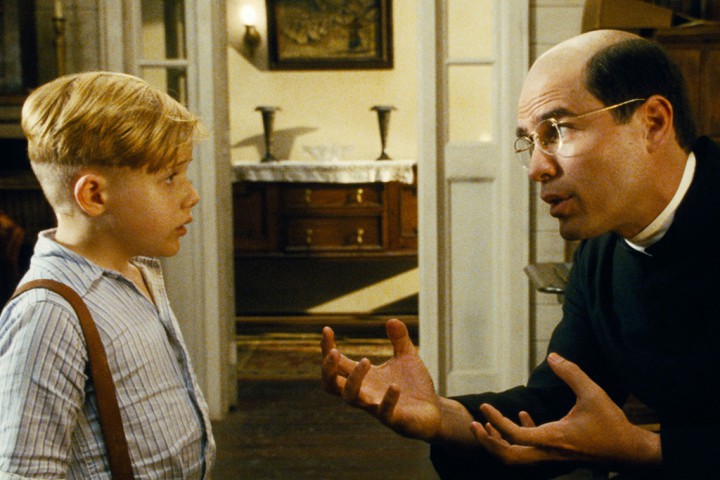Faith-based films may well be one of the last bastions of true exploitation cinema. While Little Boy might not be the worst offender ever, or even the worst to come out this year, like its brethren it relies on pandering to its prospective audience’s worldview to drive ticket sales. Little Boy follows the journey of its diminutive protagonist as he navigates a town populated almost entirely by people who hate him for being short, all the while pining for his POW dad (Michael Rapaport) and struggling with existential dilemmas that are only addressed in passing. If that premise sounds at once thin and convoluted to you, then you have a good sense of the problems plaguing Little Boy.
Pepper Busbee (Jakob Salvati) is nicknamed Little Boy by the bullying offspring of an inexplicably cast Kevin James, a town doctor with designs on Pepper’s mom Emma (Emily Watson). With the Busbee patriarch having taken the place of his flat-footed eldest son in WWII’s Pacific Theater, Dr. Paul Blart … er, Fox attempts to seduce Watson’s war-weary widow by denigrating her youngest son and openly ogling her in front of the elder. That Watson seems to consistently entertain his advances until the moment she is finally convinced of her husband’s demise is still somehow a less incomprehensible premise than an eight-year-old bully believing “Little Boy” was a sufficiently insulting moniker with which to torment his prey.
For no conceivable reason, the nickname sticks, and Little Boy is openly derided throughout the town. While the film flirts with themes of ostracization and intolerance, the real story centers on the boy’s influences in the absence of his implausibly idealized father. These influences run the gamut from his drunken, racist older brother and his mystically empowered comic book hero to his wizened old priest and the town’s sole Japanese resident, into whose company Pepper is forced by the aforementioned clergyman. The plot mechanics that lead our protagonist through these spheres of influence are contrived at best and ultimately strain credulity. Little Boy’s most compelling relationship is that between Tom Wilkinson’s pious Father Oliver and Cary-Hiroyuki Tagawa’s more skeptical Hashimoto, but rather than letting this dramatic tension drive Little Boy’s character arc, the screenwriters Alejandro Monteverde and Pepe Portillo fall back on tired cliches of shame and the fear of abandonment.
Clearly, the point of Pepper’s pejorative nickname is for the writers to associate the titular protagonist with the bombing of Hiroshima, a plot point addressed in such a way that it would’ve been deeply disturbing even were it handled more competently than it is here. Little Boy becomes convinced, through the intermingled influences of comic books and the Catholic Church, that his faith in Jesus grants him magical telekinetic abilities directly proportional to said faith. Somewhat surprisingly, very few of his town’s inhabitants seek to disabuse him of this notion. When a young priest challenges the boy’s misperceptions regarding the nature of faith, Father Oliver quickly ushers the recent seminary grad out of the room for the sin of trying to rationally explain a theological principle to a child. Consequently, when Little Boy is prompted by Father Oliver to carry out a sort of scavenger hunt of virtuous acts, the subsequent escalation of his faith-based superpowers ultimately leads to young Pepper becoming convinced of his culpability in the deaths of hundreds of thousands of Japanese through his role as the arbiter of God’s wrath. Yes, the movie directly (if bafflingly) implies that our Pepper is responsible for ushering in the nuclear age. This might have been putting too fine a point on things, were it not for the fact that the entire town congratulates our protagonist’s divergence from reality.
While this story is certainly absurd, and while the film seems to subtextually condone violence and racism, these are not its greatest offenses. As pointless as the plot of Little Boy proves to be, its true failing lies in its inadvertent conflation of faith and delusion. In attempting to address naysayers in the audience by voicing a counterposition to the film’s sanctimonious piety through Hashimoto’s legitimate skepticism, Little Boy betrays a lack of conviction that will likely injure its reception with its target audience. Though the film’s conclusion emphasizes a positive interpretation of its peculiar take on faith, it ultimately falls short of the polemical success to which it aspires. Rated PG-13 for mature thematic content and violence.








Movies like this are exactly what I meant when I said having help is helpful.
Reminds me of an old proverb: “A friend will help you move, a good friend will help you move a body, and a crazy friend will sit through terrible movies on your behalf.”
You may be all three.
Ken, I see you stuck the new guy with the faith based film. Reviewer hazing? Welcome aboard. I found Scott’s take on the Crowe film to be a great read.
Reviewer hazing? Not quite. Expendience perhaps.
Thanks for reading, swilder. I wouldn’t call it hazing so much as ensuring that the new blood is sufficiently tainted.
Hey you sat through Do You Believe? and (in a different key) Unfriended in some kind of solidarity before this happened. You were already pretty darn tainted.
And Fifty Shades: the trilogy of tai… oh, I don’t want to say it.
Tain’t so.